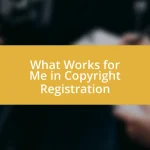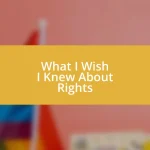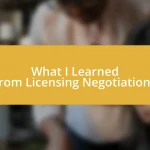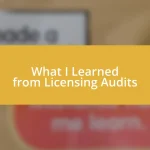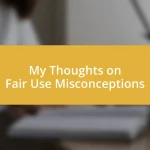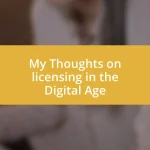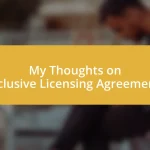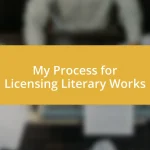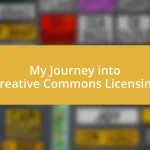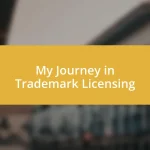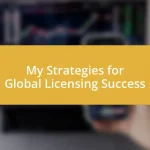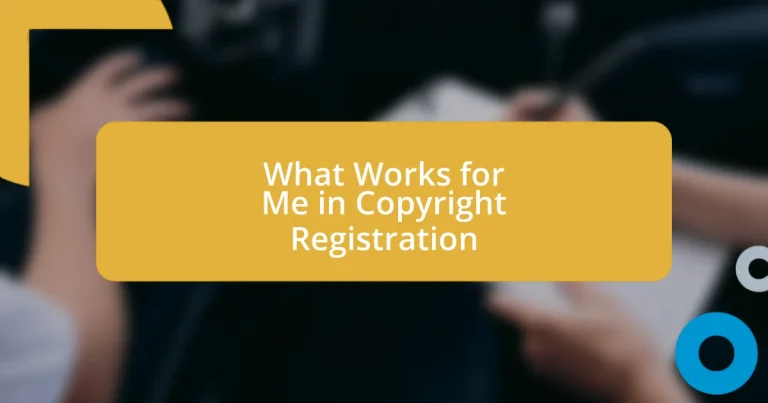Key takeaways:
- Copyright registration provides legal protection and a sense of ownership over creative works, enhancing confidence and motivation for creators.
- Common mistakes include submitting inaccurate information, underestimating processing timelines, and failing to keep proper documentation, which can hinder the registration process.
- Utilizing resources such as legal professionals, online communities, and official copyright offices can help creators navigate the registration process and stay informed about relevant guidelines.
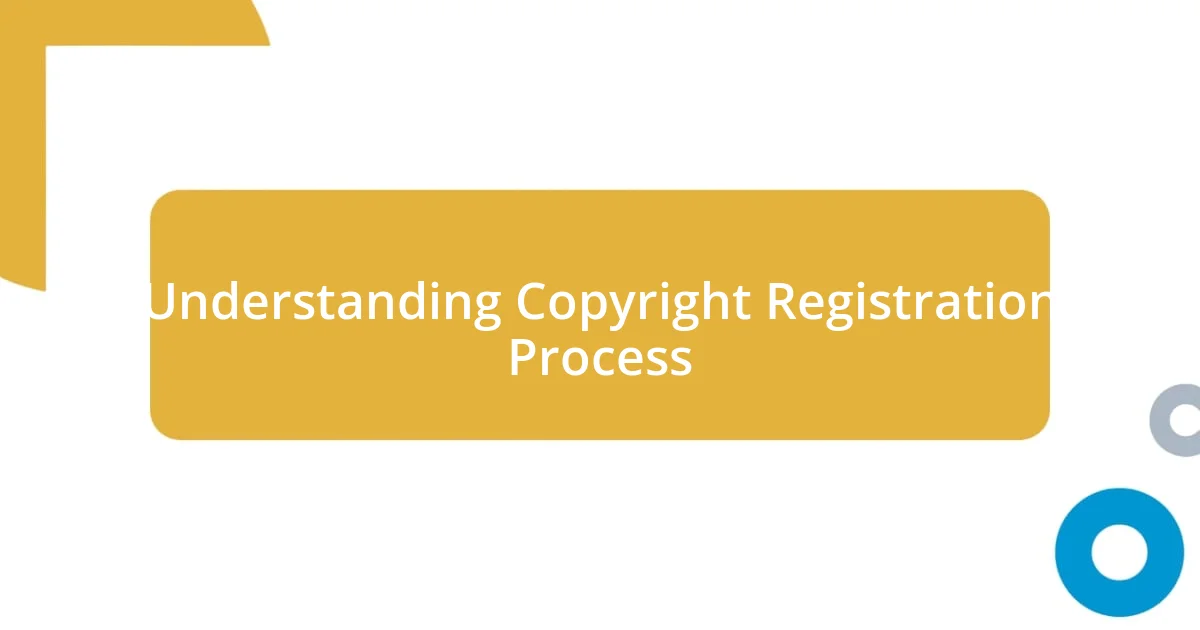
Understanding Copyright Registration Process
Copyright registration isn’t just a legal formality; it’s a vital step I always recommend to creators. When I first registered my music, I felt this surge of security wash over me. It’s like putting a lock on your front door; it doesn’t stop someone from entering your home but gives you a solid reassurance that you’ve done what you can to protect your space.
The process usually begins with filling out an application, and let me tell you, it can be a bit daunting. It’s not just about paperwork; it requires careful attention to detail and a genuine understanding of what you’re protecting. Have you ever felt overwhelmed by legal jargon? I know I have. That’s why I always advise seeking resources or professionals who can help clarify any confusing terms and ensure you fill it out correctly.
Once submitted, you might find yourself in limbo, waiting for approval. This waiting period can feel like time stands still, but it’s worth it! When I received my certificate, I had this profound sense of validation and ownership that fueled my passion even more. It felt like my hard work was finally recognized, which brought a thrill I can hardly describe—have you ever experienced such a moment? That feeling of affirming your rights over your creation is truly empowering.
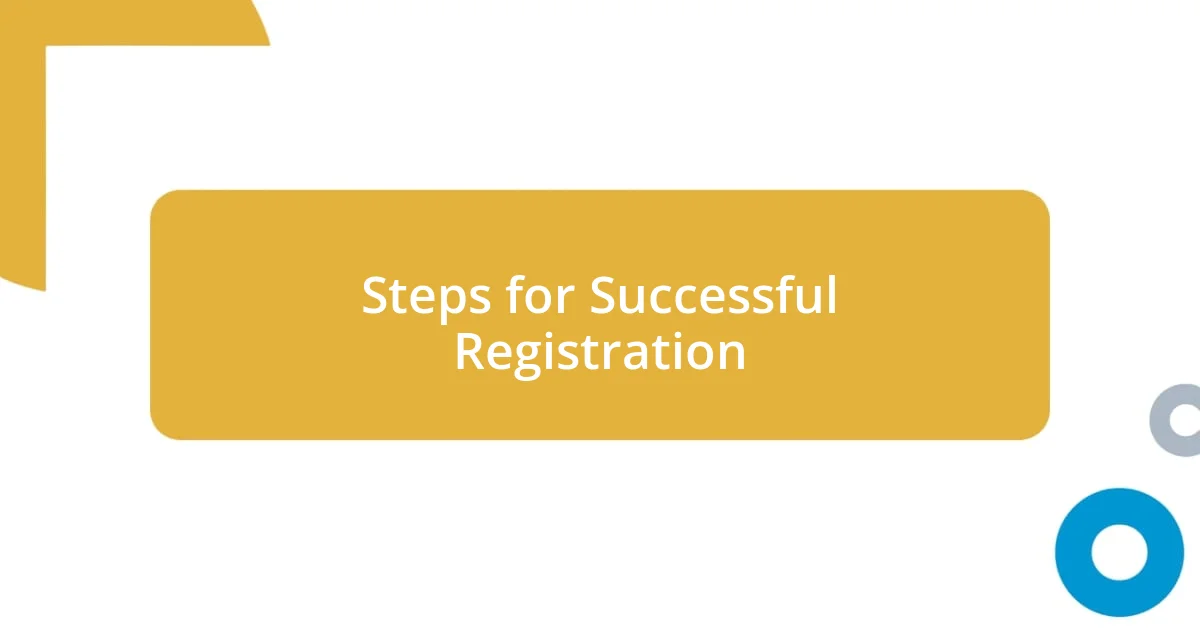
Steps for Successful Registration
When I started my journey with copyright registration, I learned that taking it one step at a time really helps. The first crucial step is gathering all relevant materials regarding your work, such as drafts, recordings, or designs. It made me realize how important it is to have everything organized, as it not only smooths the process but also serves as a reminder of how much effort I’ve put into my creation. Here’s a practical rundown of the steps I consider essential for successful registration:
- Gather Your Work: Collect all versions of the work you want to register.
- Complete the Application: Spend time ensuring that every detail is accurate and complete.
- Pay the Fee: Be prepared for the registration fee, which can vary depending on the type of work.
- Submit Your Application: Choose a reliable method for submission, whether online or by mail.
- Follow Up: Keep track of your application status if you don’t receive confirmation promptly.
The emotional aspect of registration can’t be overlooked, either. I vividly recall the day I submitted my application; there was a mix of excitement and anxiety. I knew I was taking a significant step to protect my work, but also felt a sense of vulnerability, putting my creation out into the world. The anticipation became a powerful motivator, pushing me to keep creating while I awaited the response. How about you? How does the thought of securing your work affect your creative process?
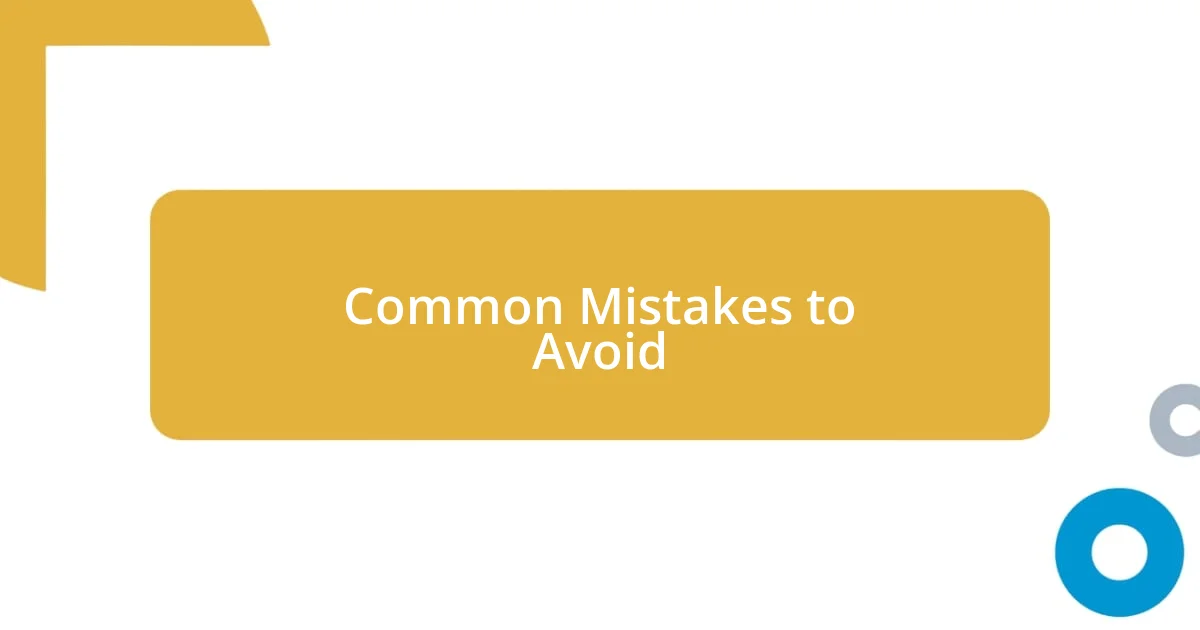
Common Mistakes to Avoid
When navigating copyright registration, one significant mistake I’ve witnessed is overlooking the importance of accurate information. I once had to deal with a friend who incorrectly spelled their title on the application. It might seem minor, but it delayed their registration process and created unnecessary stress. Always double-check every detail to ensure your application reflects your work as intended.
Another commonly made error is underestimating the timeline. I remember eagerly awaiting my own registration certificate—thinking it would arrive almost instantly. The reality was quite different; it took several months. Patience is key. Understanding that processing times can vary helps in managing expectations and keeping your creative momentum going without being distracted by the wait.
Lastly, not keeping records can be a costly oversight. I learned this the hard way when I failed to save previous drafts while submitting my work. If any disputes arise, having documented proof of your creation’s evolution is invaluable. I always recommend maintaining a well-organized portfolio of your work to safeguard your rights effectively.
| Mistake | Impact |
|---|---|
| Inaccurate Information | Delays in registration and potential issues with asserting ownership |
| Underestimating Timeline | Increased anxiety and disruption in creative flow |
| No Record-Keeping | Challenges in proving ownership during disputes |
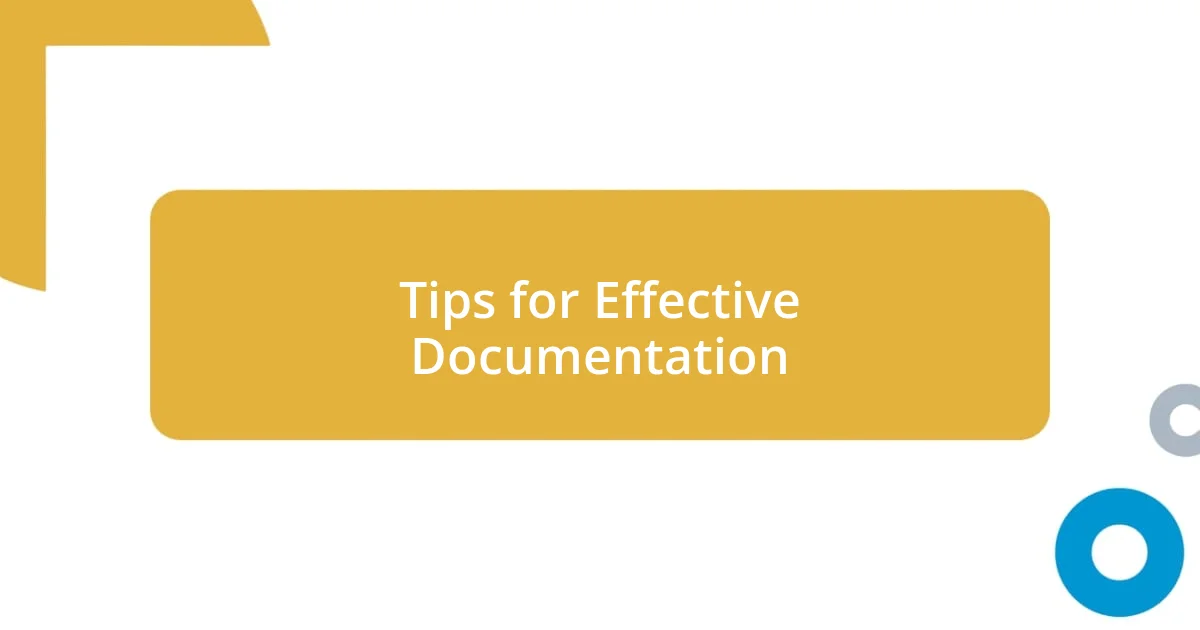
Tips for Effective Documentation
When it comes to effective documentation, I can’t stress enough the importance of consistency. I remember a time when I neglected to date my drafts, thinking it wouldn’t matter in the grand scheme of things. What I learned was that having a clear timeline is essential, especially if questions about authorship ever arise. So, make it a habit to date everything—it’s a small detail that pays off.
Organizing your materials in a digital format also helps immensely. I once faced a nightmarish situation when looking for an old recording among a mass of files. It took me hours to find it, and in that moment, I realized how beneficial a structured digital filing system could be. Use folders and clear labels, which can save you stress later when you need to access your work quickly. How often do you find yourself scrambling to find that one piece you knew you had?
Additionally, I believe in the power of notes. I’ve kept a notebook dedicated to my thoughts on each draft—a simple yet effective technique. Whenever I revise, jotting down why I made changes not only tracks my creative journey but also solidifies my ownership. When I look back, those notes remind me of the passion and intent behind each modification. Do you take time to reflect on why you create?
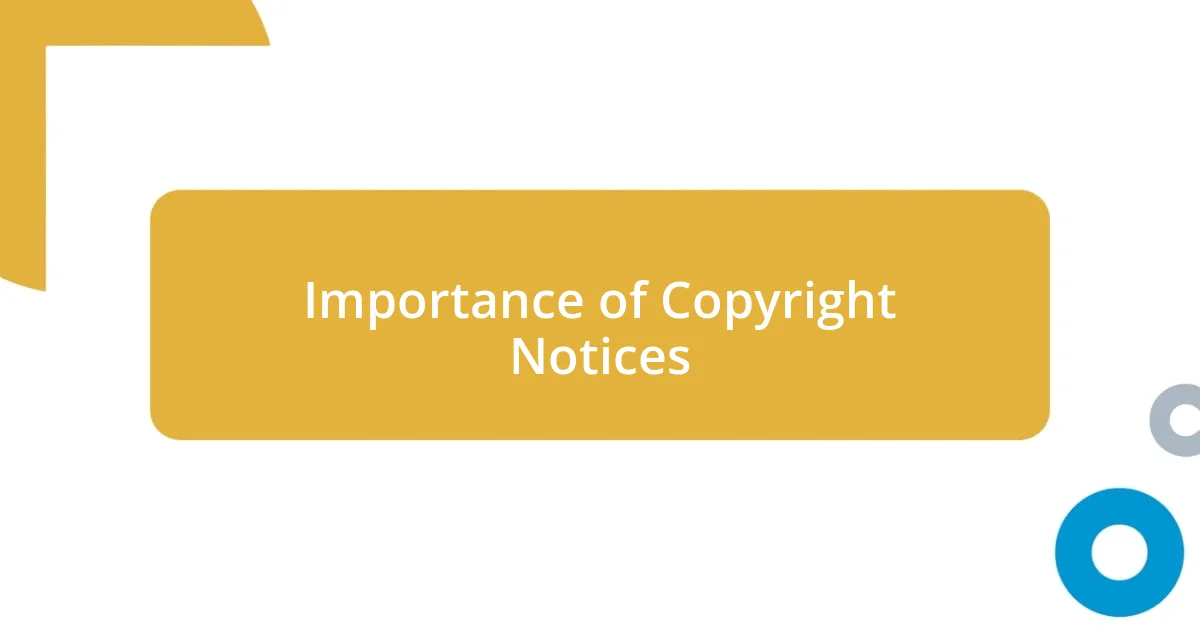
Importance of Copyright Notices
Copyright notices play a crucial role in signaling ownership over your creative work. I distinctly remember feeling a rush of confidence when I added a copyright notice to my first self-published book. Just seeing that little © symbol made me feel more secure, as though I was affirming my rights and making it clear to others that this creation was mine. Have you ever considered how showcasing your copyright can influence the perception of your work?
An effective copyright notice not only serves as a deterrent against infringement but also communicates the seriousness of your intentions as a creator. When I first shared my artwork online, I chose to include a prominent copyright notice. It communicated to viewers that my work was protected, which, in turn, encouraged respectful sharing rather than misuse. Don’t underestimate how a simple statement can elevate the respect others have for your creations.
Additionally, having a copyright notice demonstrates your commitment to your craft—it expresses that you value your work and the effort put into it. I often reflect on how, during my early days as a creative professional, I didn’t prioritize these notices. It wasn’t until I faced a few minor infringements that I realized their importance. How about you? Have you made your copyright stand out in a way that communicates your passion for your work?
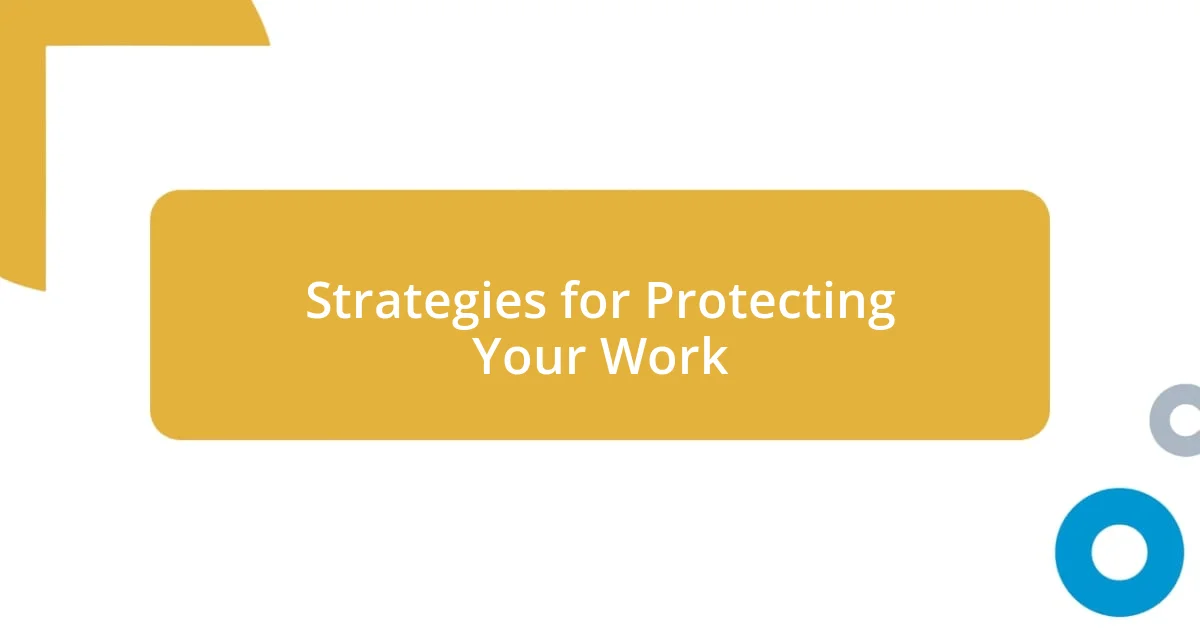
Strategies for Protecting Your Work
When it comes to protecting your work, registering your copyright is a strategy that should never be overlooked. I recall the moment I filed my first copyright application; it felt like I was finally taking serious ownership of my creations. The validation from having that legal backing made me feel energized, knowing I was safeguarding my hard work against potential misuse. Have you ever felt that sense of accomplishment from taking a proactive step in securing your rights?
Another effective strategy I’ve embraced is using contracts when collaborating with others. I remember a project where I failed to establish clear terms with a co-creator, and it led to misunderstandings about ownership later on. Now, I always draft simple agreements outlining expectations and rights, as it creates transparency and ensures everyone knows their roles. What about your collaborative experiences—do you have agreements in place to protect your contributions?
Additionally, I believe in the power of watermarking my digital content. Early in my journey, I learned the hard way when I saw one of my images reposted without credit. Since then, I’ve made it a point to add a subtle watermark to all my visuals. This not only preserves my rights but also promotes my name every time someone shares my work. Have you considered how simple measures, like watermarks, can enhance the visibility of your creations while keeping your rights intact?
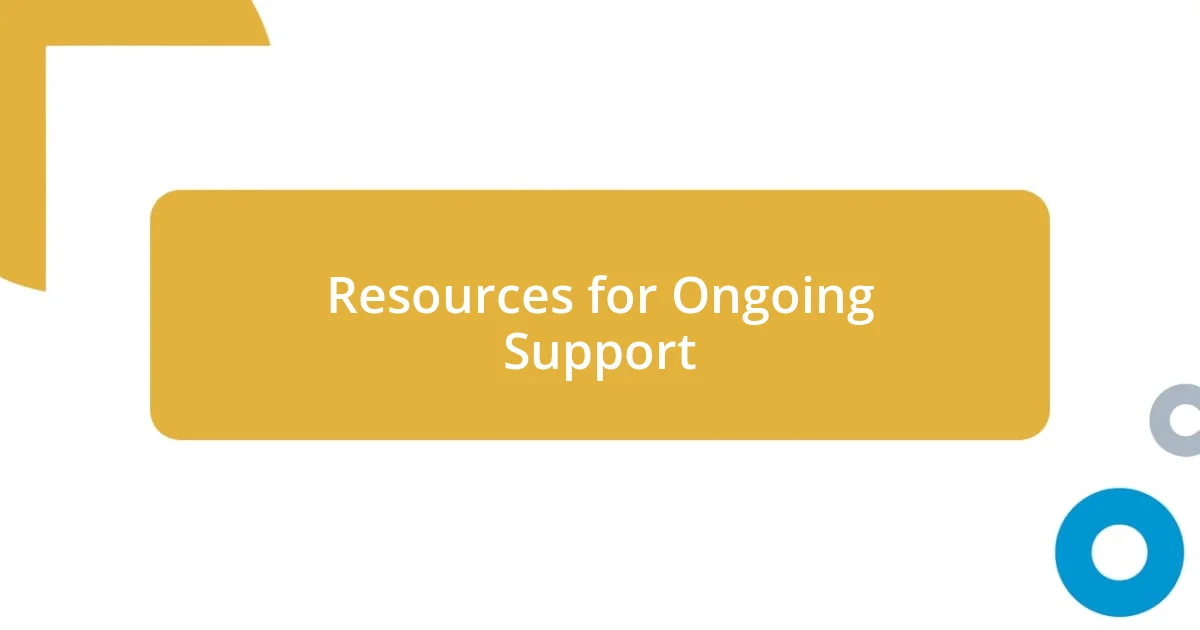
Resources for Ongoing Support
In my journey, I’ve often turned to online communities for ongoing support in navigating copyright registration. I remember joining a forum dedicated to creators where I could ask questions and share experiences. The camaraderie I found there was invaluable, reminding me I wasn’t alone in this complicated process. Have you found any supportive online spaces that have helped you with your copyright concerns?
Legal professionals can also offer tailored insights and clarifications when I find myself stuck. I once consulted a copyright attorney about a unique situation related to my work, and their expertise opened my eyes to options I hadn’t considered. Investing in guidance from someone knowledgeable can feel like a safety net, allowing me to tackle my creative projects with greater assurance. Do you think consulting with a professional could enhance your understanding of copyright issues?
Additionally, I often rely on resources like government copyright offices for the latest guidelines and updates. They offer comprehensive information that has helped me stay informed about any changes in the law that could affect my work. I recall a time when I stumbled upon a new regulation that required my attention for a project I was working on. Staying updated not only protects my rights but also allows me to make informed decisions. How frequently do you check these official resources to ensure you’re up to date?
